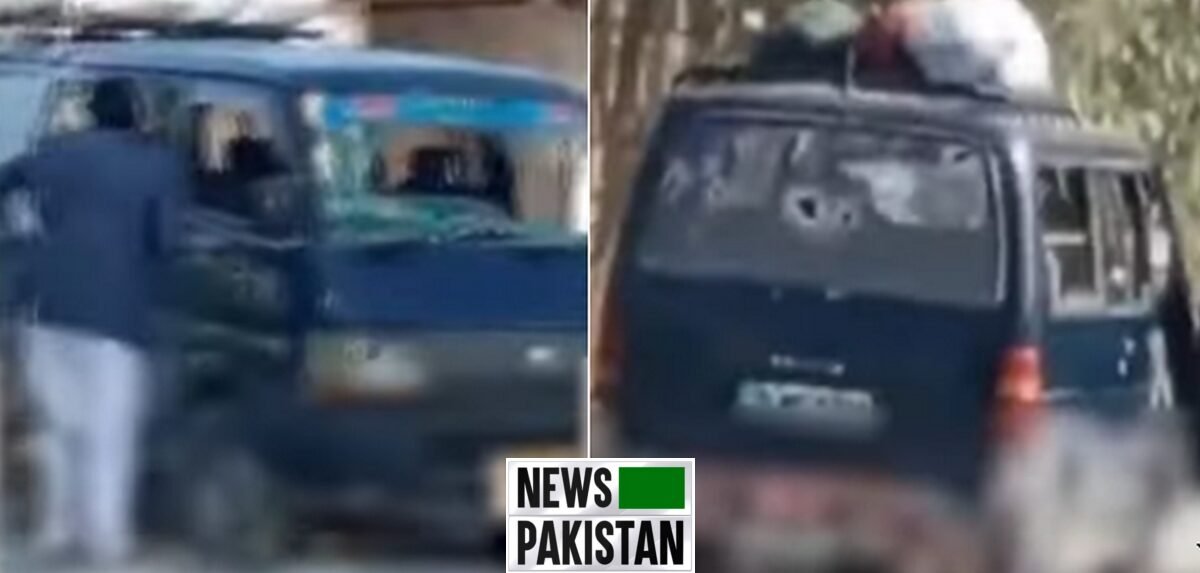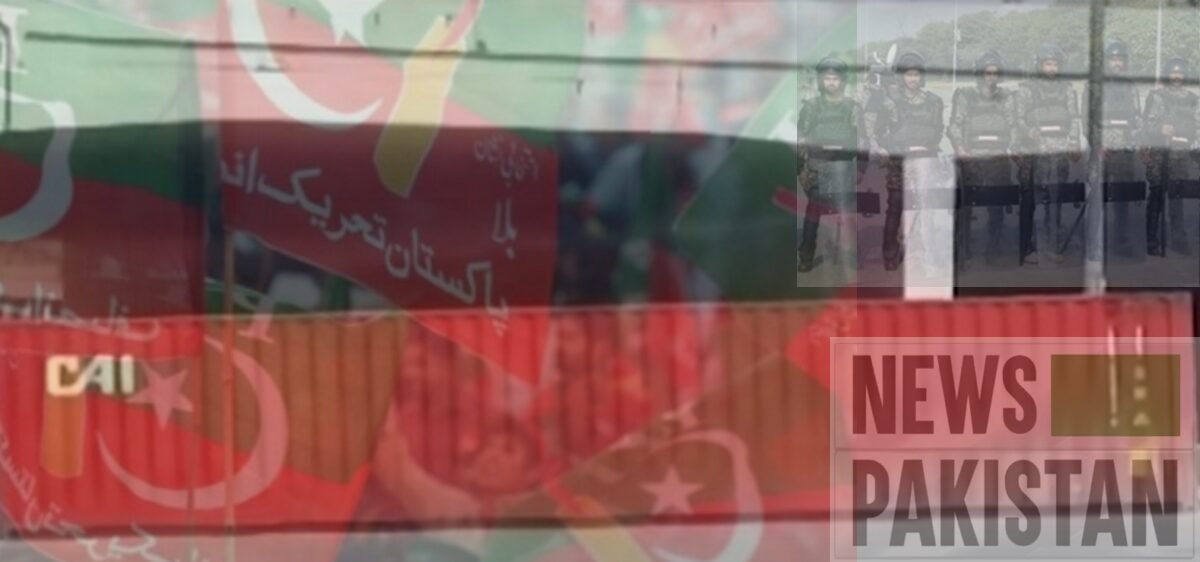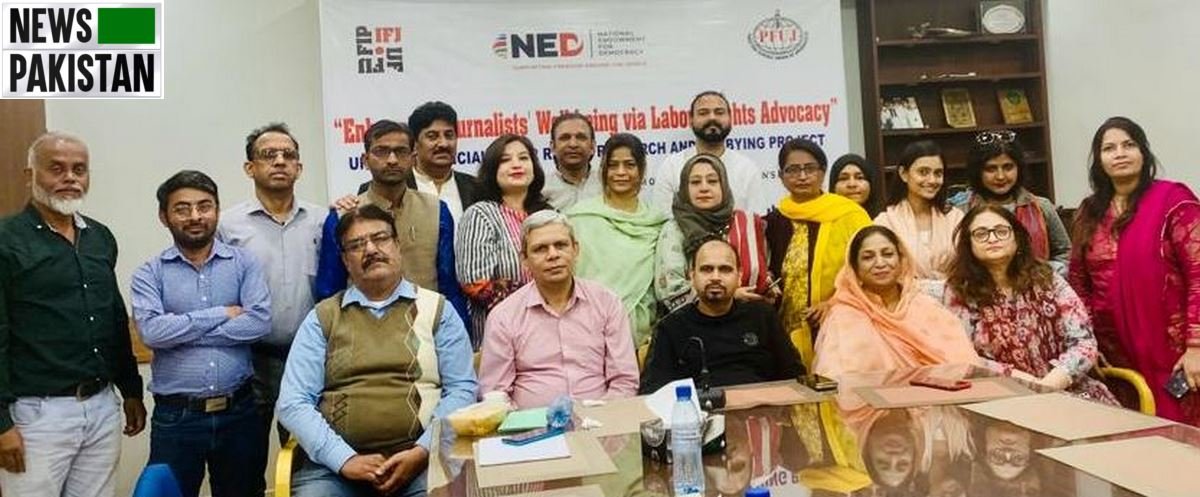KARACHI: Pakistan Federal Union of Journalists (PFUJ) with the collaboration of International Federation of Journalists (IFJ) held a one-day workshop on labor laws for the journalists of the Port City at Karachi Press Club (KPC).
Journalists from print, electronic and digital media, especially female journalists, participated in the workshop.
The closing ceremony of the workshop was addressed by President PFUJ GM Jamali, Secretary of KPC Shoaib Ahmed, senior journalist and former President of Karachi Union of Journalists (KUJ) Syed Hasan Abbas, IFJ Focal Person/Workshop Trainer Sheher Bano and IFJ Gender Coordinator in Pakistan Lubna Jerar Naqvi.
Speaking on the occasion, President PFUJ GM Jamali maintained: “Pakistan is a dangerous country in terms of doing truthful journalism.
“Undertaking extremely difficult job, the journalists sometimes have to risk their lives.
“That is why PFUJ is trying not only to work towards the capacity building of journalists but to support them for the difficulties they face in the field”.
He spoke about his recent meeting with the Sindh Chief Minister Maqbool Baqar along with PFUJ and KUJ teachers in connection with their joint demand for the arrest of the killers of Jan Muhammad Maher.
Jamali told that the purpose of the meeting was to put pressure on the government to take the responsibility of protecting the lives of journalists, and ensure that justice is provided to those who have lost their lives in the line of duty.
PFUJ President G. M. Jamali, informing that in the last two years, PFUJ had organized more than 20 workshops on various topics in many districts of Sindh, including Karachi, to build the capacity of Media workers especially female journalists, said the process would continue in the future as well.
Secretary KPC Shoaib Ahmed thanked PFUJ, IFJ and the organizers of the workshop, terming it as the need of the hour to make Media workers aware of their rights.
“Through such workshops, employees working in the media industry can get better information about their rights, because a large number of workers are not fully aware of their right,” he observed.
Shoaib Ahmed held that KPC, KUJ and other UJs will have to work together to raise awareness among Media people about their rights and will have to join hands to fight for their rights.
He termed IFJ’s workshops for journalists in various districts of Sindh, including Karachi, on Media laws and their rights as a welcome step.
Secretary KPC emphasized on making comprehensive plans for media employees with the help and support of legal experts as well as experts having knowledge of labour laws.
Ahmed expressed great concern over laying off of a large number of Media workers, especially reporters and cameramen, from their jobs due to lack of awareness of their rights and lack of job security and safety.
As a result, new problems are emerging for journalists across Pakistan.
He said the monthly salary of journalists as well as correspondents in Sindh is not fixed and the irony is that no one talks about it.
He also emphasized the need for journalists to adopt modern technology to highlight their issues through online complaints mechanism at the international level.
Shoaib Ahmed thanked PFUJ, IFJ and especially workshop trainer Sheher Bano, senior journalist Syed Hasan Abbas, and others for creating awareness among journalists of the Metropolis about labour laws.
Vowing to continue KPC’s full support for such workshops in the future as well Shoaib Ahmed said that he would be always at the forefront in all efforts for the rights of the employees.
Sohail Ahmed hoped that IFJ and PFUJ would continue to organize such workshops in the future.
Syed Hasan Abbas informed the journalists about the Newspaper Employees Condition of Service Act, 1973 and the Pakistan Electronic Media Crime Act (PECA) and PEMRA laws and how these laws are violated at a large scale. He also answered queries of the participants.
Hasan Abbas said: “It is mandatory for newspapers management to abide by these laws, but violations occur and majority of employees cannot take their cases to the court due to lack of knowledge about laws. “
Abbas also observed that new digital platforms like Youtube and web channels and even on electronic media channels, violate ethical standards of journalism and risk their lives as their headlines or news contents are not fully verified.
“This is one of the major reasons for a decline of journalism standards.” He thanked the secretary KPC for providing all facilities for the workshop۔

While giving her presentation on state of decent work in Sindh, Trainer Sheher Bano informed the participants that the said project supported by IFJ.
Under which the first ever survey on decent work has been conducted to find out the working conditions of journalists in seven districts of Sindh.
She further informed that a formal report had also been prepared with the findings of the said survey.
The survey’s findings show that majority of journalists face issues like low and delayed salaries, lack of medical facilities, lack of washrooms and transport facilities for women.
Sheher Bano said that there was no salary structure or facilities for journalists in Sindh who are working as correspondents of various Media houses.
The survey also covered unawareness about laws and safety issues of the field faced by the journalists.
Bano said one of the most serious problems is related to the security of journalists such as harassment, censorship, mental and physical violence by state or non-state actors, registration of fake FIRs, bullying and threats.
To top to all that the journalists are not given any help from their organisations.
The survey revealed journalism has seen a decline in the last few years and many newspapers and channels have been closed, rendering journalists jobless.
She said as per survey, there is a general dissatisfaction of journalists from their unions, but the survey also reveals that most of journalists are unaware of the laws which can give them relief.
She said the survey which was done as a pilot project in Sindh has the potential to be done across Pakistan to get the clear picture of the working conditions of journalists.
Once the data is collected, it will help improve the working conditions of journalists across Pakistan.
She asked journalists to repose their trust in their unions and come forward to raise their voices, especially women should come forward.
She said PFUJ is aware of the lack of on-the-job training of journalists that is why they are conducting such training.
She said a one-day workshop is not enough to learn about all labour laws, but PFUJ will continue to build the capacity of journalists in the future as well.
IFJ’s Gender Coordinator in Pakistan, Lubna Jarrar Naqvi, while informing the participants about various leadership skills, insisted women to come forward in leadership position, so that a strong and inclusive journalism system can be established in Pakistan.
She said only strong and bold voices could raise concern on the atrocities or the injustices done to the journalists and PFUJ not only provides that platform, but also gives voice to women.
Sheher Bano said “our survival lies in knowing the laws related to our jobs, and a strong unified voice for our rights“.



KARACHI: At the end of the workshop, Shoaib Ahmed, GM Jamali, Syed Hasan Abbas and Sheher Bano presented certificates of appreciation to the workshop participants.
__________________________________
Newspakistan.tv











